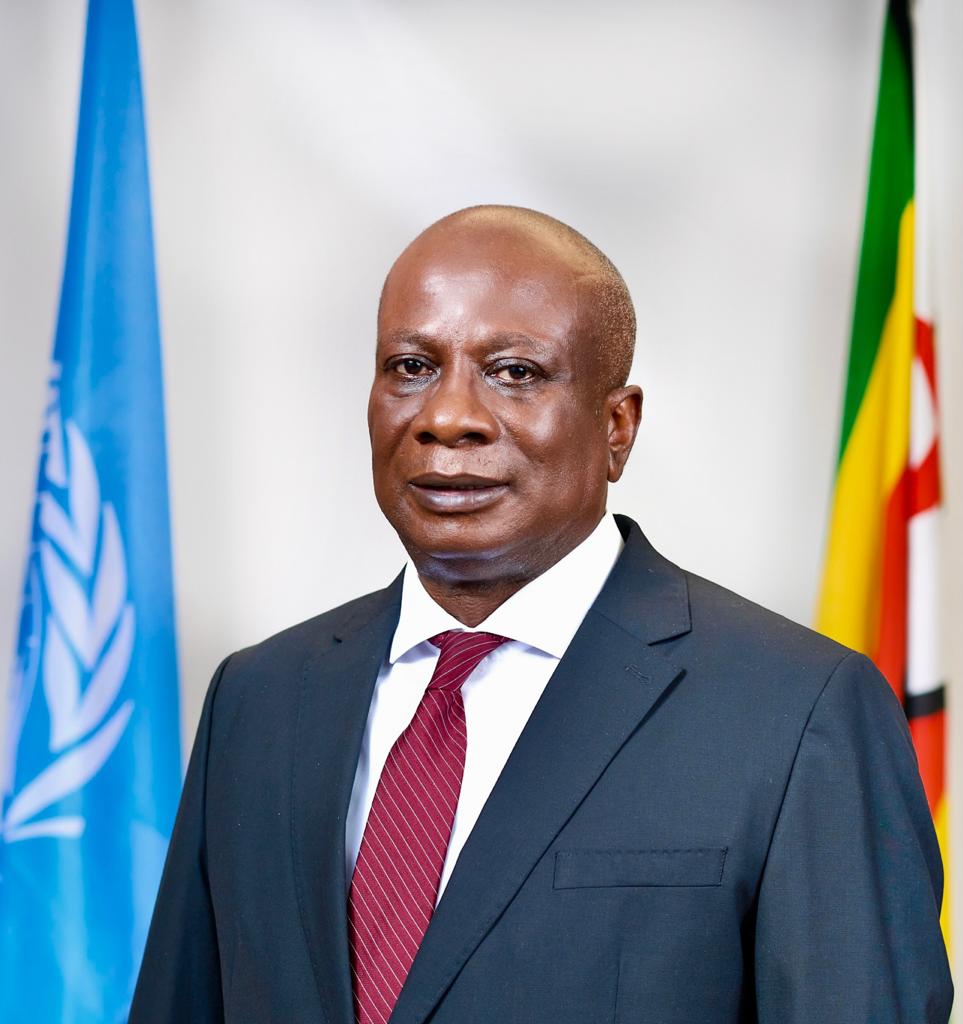|
Getting your Trinity Audio player ready...
|
Multilateralism and diplomacy for peace are cornerstones for sustainable development, cooperation, and peaceful co-existence, a senior government official and top UN official have said.
Dr. Frederick Shava, Minister of Foreign Affairs and International Trade made the remarks in his keynote address during a Media Brief on International Day of Multilateralism and Diplomacy for Peace on 26 April 2022 that was held at the Bulawayo Club, coinciding with the ongoing Zimbabwe International Trade Fair (ZITF) in the City of Kings and Queens.
The International Day of Multilateralism and Diplomacy for Peace was established on 12 December 2018 through resolution A/RES/73/127. It is an effort by the United Nations, to preserve the Charter that binds all States together towards a singular purpose of sustainable development, cooperation and peaceful co-existence.
“On this important day when the international community collectively reflects on the state of multilateralism and international co-operation in general, it is regrettable to note that negotiations and general discourse within the United Nations and in other multilateral fora have increasingly demonstrated a concerted assault on previously agreed principles governing international relations.
“As a former Ambassador myself, and now Minister of Foreign Affairs and International Trade, I have witnessed a worrisome trend where our colleagues representing developed countries are increasingly retreating from agreed positions and settled principles such as the principle of common but differentiated responsibilities; financing for development; the agreed Official Development Assistance of 0,7 percent of GDP; preferential treatment of developing countries in general; and special and differential treatment of developing countries, among other principles,” Dr. Shava said.
He expressed concern regarding a new development where developed countries seem to be back-tracking from agreed positions and time-honoured principles, thereby weakening the foundations of international cooperation.
“There has been a corresponding and growing tendency towards preference erosion, and a spirited campaign to place such burdensome commitments on us, the developing countries, in the areas of climate action, trade liberalisation, investment protection, among others. In the meantime, developed countries have been relentless with initiatives seeking unfettered access to our resources, while they themselves pursue protectionist policies in areas of trade, agriculture, technology transfer, and intellectual property. Zimbabwe will continue to register its concern for unilateral and plurilateral initiatives, and emphasize the primacy of the multilateral character of the United Nations.”
For the last seven decades since the end of the Cold War, Dr. Shava said, the world has witnessed a plethora of challenges, ranging from climate change, geopolitical tensions, terrorism, and humanitarian and migratory crises all with cross-cutting effects. These challenges have had a profound effect on the practice of diplomacy. Redress of these challenges requires multilateral diplomacy.
He underscored the importance of solidarity and cooperation in the world we live in today, especially on urgent international issues, and encouraged global cooperation for the common good, with a deep understanding that everyone has a responsibility to shape the world that we live in.
The senior diplomat said Zimbabwe is committed to multilateralism and has strived, since independence in 1980, to employ instruments of diplomacy and cooperation as provided in the UN Charter to achieve its goals and insisted that benefits are derived from acting collectively rather than individually in the urgency of global problems.
Experiences with the COVID-19 pandemic have shown that vaccine nationalism, where national governments tend to follow their own interests instead of pursuing a more globally coordinated approach, has dealt a fatal blow to multilateralism. Instead of uniting as one in the face of a global pandemic that threatened to wipe humanity off the surface of the earth, countries jostled for prestige, pushed selfish agendas, while some strived to get first access to supplies of vaccines for the purposes of hoarding and using this for geopolitical advantages.
Dr Shava said such nationalistic behaviour has negative consequences on how effective the global pandemic can be managed and contained, adding that while a lot of leaders have reaffirmed their commitment to multilateralism and international peace and security at international fora, challenges such as climate change and the need to meet commitments under the 2030 Agenda for Sustainable Development will require more commitment than platitude and general statements of solidarity.
The minister said the world today faces this dire situation, which has seen countries in the southern hemisphere is the most affected. Solutions to climate change and to many other challenges require a holistic, multilateral approach. It requires selflessness, togetherness, understanding, holistic and pragmatic solutions.
“Zimbabwe notes with appreciation, the increase in the number of countries that have denounced Unilateral Coercive Measures imposed by some powerful Western countries against weaker developing countries. Excellencies, sanctions are a form of economic warfare, designed to cause suffering and disharmony. Sanctions signify the failure of diplomacy and peaceful resolution of disputes. It is difficult for multilateralism to strive where there is punishment. The world could be a better place if UN member States, which respect the Charter of the United Nations, solved their disputes in more pacific ways, than recourse to war and coercion.
“The United Nations is the embodiment of multilateralism as its existence ensures equality and cooperation among member states. Its continued existence is in the interest of all mankind. A number of challenges, however, threaten this existence to name a few: Unilateralism by powerful countries; dysfunctional structures that have served their purpose and therefore, need to be reformed; self-serving agendas set by the powerful, and a general disdain for the poor and less developed countries. Zimbabwe reiterates its position that multilateralism will survive only if the United Nations Security Council is reformed to accommodate regional balance and equitable representation. We in Zimbabwe would like to see the continued strengthening of the United Nations. We support the reform of the Security Council so that it is more representative of the Global outlook and present-day realities. Reform of the Security Council would thus strengthen the forces of Multilateralism and promote peaceful co-existence,” Dr. Shava added.
Speaking on the same occasion, UN Resident and Humanitarian Coordinator for Zimbabwe, Mr. Edward Kallon quoted the UN Secretary General’s message on multilateralism and diplomacy for Peace Day delivered on 24 April as follows “Today, multilateralism is under attack from all sides. From the climate crisis to the multiplication of conflicts – including the ongoing war in Ukraine; the governance of weapons of mass destruction; health emergencies; and the global refugee protection regime. These crises pose a threat to all three pillars of the work of the United Nations – peace and security, development, and human rights.

The COVID-19 pandemic is a tragic reminder of how deeply connected we are. There is a clear and urgent need for concrete multilateral solutions, based on common action across borders for the good of all humanity, starting with the equitable distribution of vaccines as a global public good.
We need a more networked multilateralism, with stronger coordination between regional and international organizations, international financial institutions, and public-private alliances.
We need an inclusive multilateralism that draws on civil society, business, local and regional authorities and others, and shares power more broadly and fairly.
And we need strong multilateral action now, to emerge from the pandemic safely, to address the climate crisis, and to build stronger, safer communities and societies.”
Mr. Kallon said the day reaffirm the UN Charter and its principles of resolving disputes among countries through peaceful means. Peace is a fundamental requisite, and condition sine quo non for sustainable development.
“Violent conflict is increasingly recognized as one of the big obstacles to reaching the Sustainable Development Goals (SDGs) by 2030. Its dramatic resurgence over the last few years has caused immense human suffering and had an enormous global impact. Approximately 2 billion people live in conflict-affected countries and there were a record number of 56 UN member state-based conflicts in 2020. The International Day of Multilateralism and Diplomacy for Peace acknowledges calls on the urgent need for peaceful resolutions to conflicts among nations,” Mr. Kallon said.
The United Nations strongly advocates for conflict prevention. This means doing everything to help countries avert the outbreak of crises that take a high toll on humanity, undermining institutions, and capacities to achieve peace and development.
Turning to Zimbabwe, he said the UN supports one of the national priorities through the 2022-2026 Zimbabwe UN Sustainable Development Cooperation that all people in the country, especially the most vulnerable and marginalized, benefit from more accountable institutions and systems for rule of law, human rights, and access to justice. This a building block for sustainable peace.
the Senior UN Official said the global architecture for peace and security, forged in the aftermath of World War II, is grounded in the universal commitment to “save succeeding generations from the scourge of war” (United Nations Charter, preamble).
“With conflicts becoming more fragmented, more complex, and more transnational, these tools are being profoundly challenged by the emergence of non-state actors, ideologies at odds with international humanitarian law, and increased sponsorship of proxy warfare,” Mr. Kallon said.
He reiterated the fact that the human and economic cost of conflicts around the world requires all of those concerned to work more collaboratively through the tried and tested multilateral arrangement and diplomacy.






